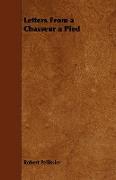- Start
- Letters from a Chasseur a Pied
Letters from a Chasseur a Pied
Angebote / Angebote:
INTRODUCTION When Robert Pellissier gave his life to France, there were still among his acquaintances some people who asked But why did he enlist And they frankly admitted there were some traits in his character which they did not understand. Bearing in mind these queries, I endeavored to answer them in a brief sketch written for the Williston Bulletin. This sketch, as well as a Colleagues Tribute, is reproduced here as an introduction to the Letters of a Basfeur d Pied. A. P. Dulce et decorunt est pro patria mori The Spirit of France as Portrayed in the Life of a Former Williston Teacher Killed in the Somme Offensive On September 18th news reached us that Robert Pellissier, of the French chasseurs A pied, had been killed in battle. To his family his life has been and always will be the greatest inspiration. When I think of my brothers life, the picture which rises before me is that of a young horseman coming at full speed over hill and dale, He is neither dismayed nor halted by any obstades he clears them all lightly and with a joyous Introduction shout. At the end of his course, he meets death on a battle- field, bravery fighting for France. One of Roberts chief characteristics was his profound attachment to his native land. He was born in 1882 at La Ferriire-sous-Jougne, Doubs, in the Jura Mountains, and while severe and almost tragic beauty of the fir tree forests, extending for miles over the mountainsides, was so strongly stamped on his memory that he always longed for fir cIad mountains and loved those landscapes best which came nearest to this type of natural beauty. Robert was the youngest of a family of seven children, and as his father died when he was but six years old, in the course of his life, when he came in closer contact now with one and now with another of his brothers and sisters, he eagerIy asked them for his share of the moral guidance left them by their father as their most precious heritage. Roberts father, after having Iived the greater part of his life near Grenoble and in Lyons, had finally became superintendent of a large wire and nail factory at La Ferriire. The owners of the mill, the employees, the eight hundred workmen constituted the hole settlement. As in this Roman Catholic community our family was the only one which was of Huguenot ancestry, and as the only Protestant church was several miles distant, our father, in his own way, gave us religious training. In summer, on Sunday, when the weather was fair, he often took us to a part of the forest where old fir trees, standing wide apart, left an open space as dark and mysterious as a cathedral, and there he would read to us either a psalm of David or a passage from rhe GospeIs, and the reading over, he would tell us how, in olden times our Huguenot ancestors had fought for their faith and how for centuries before the great French Revolution, they had prayed and worshipped in the wilderness, in some clearing or by the side of a stream. Solletitrles my iather vuuld tell us about the Huguenots of the CPvennes, and sometimes he would describe the wanderings of rhc JValdences.....
Folgt in ca. 10 Arbeitstagen
